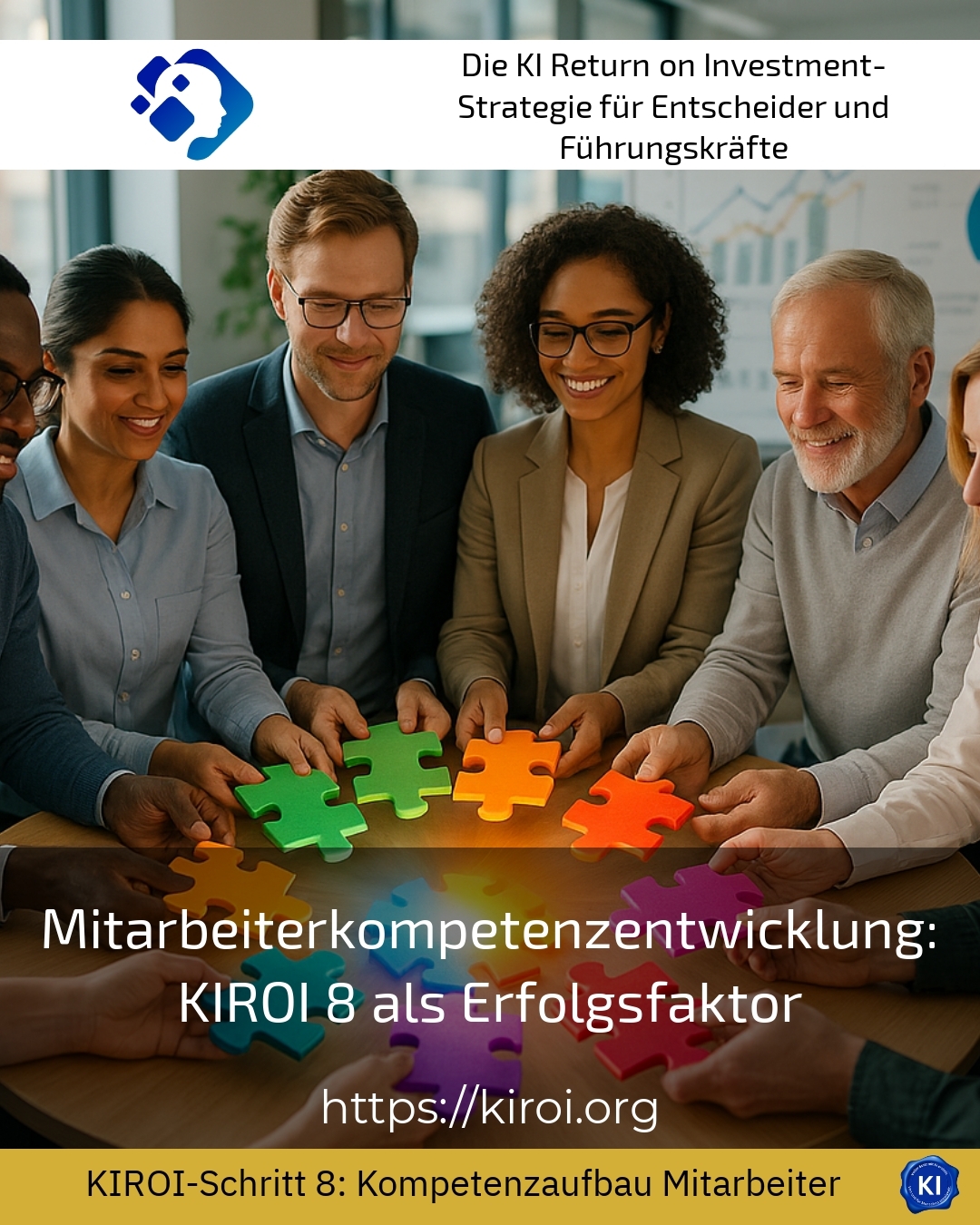Employee skills development is a key success factor for companies that want to remain competitive in the long term. The targeted promotion of the skills and abilities of the workforce makes a significant contribution to strengthening innovative capacity, improving products and services and promoting agile work processes. The KIROI 8 concept plays an important role here as a strategic guideline for organising all development processes efficiently and sustainably. This article will provide you with practical insights and concrete examples of how employee skills development can be successfully supported in various industries.
Employee skills development with KIROI 8: A systematic approach
KIROI 8 structures employee skills development into clearly defined steps that include both strategic needs analyses and practical implementation. An initial example from the automotive industry shows how a needs analysis determines which digital skills will be essential in production in the future. The HR development team identified a gap in the application of new AI-based quality assurance tools. Building on this, individual training sessions and practical workshops were planned to enable employees to use specific AI tools with confidence. This not only supports efficiency, but also the acceptance of new technologies among the workforce.
In the service sector, for example at a large insurance company, the focus on methodological expertise was particularly important. By implementing job rotation and project-based learning, employees were able to try out different tasks and expand their overarching skills at the same time. The support provided by experienced coaches supported the individual learning process and promoted adaptability.
In medium-sized manufacturing companies, the topic of employee skills development was realised through practice-oriented on-the-job training. This involved managers supporting employees more closely with new tasks, which increased both motivation and self-confidence. KIROI 8 promotes a culture of learning and continuous improvement.
Practical methods for sustainable skills development
For holistic employee skills development, it makes sense to combine different methods. In the IT sector, for example, companies rely on blended learning, which combines classroom training with e-learning modules. Employees benefit from flexible learning times and practical exercises that support the acquisition of knowledge. This not only promotes technical skills, but also self-organised learning and independent action.
Another example from the healthcare sector shows how case studies and peer-to-peer dialogue within mastermind groups are used to strengthen soft skills such as communication and conflict resolution. Employees often report that the direct exchange with colleagues gives them new impetus and creates greater confidence in their own expertise.
In sales companies, coaching is also used to promote individual strengths and work specifically on weaknesses. This individual coaching can respond dynamically to the needs of employees and supports the process of expanding leadership skills and learning motivation.
BEST PRACTICE with one customer (name hidden due to NDA contract) A medium-sized technology company used KIROI 8 to promote the transfer of digital skills from the IT department to sales. Through targeted workshops and coaching, employees were supported in the use of digital tools, enabling them to analyse and approach customers much more effectively. The result was a measurable increase in closing rates and greater satisfaction within the team.
KIROI 8 as a success factor for employee skills development
The strength of KIROI 8 lies in its modular and holistic approach. Companies can use it to systematically plan, manage and evaluate their employee skills development. The combination of practice-orientated learning, accompanying coaching and conscious reflection is particularly important. In this way, not only professional, but also methodological, social and personal competences are developed in a sustainable manner.
An example from the world of finance shows how ethical and critical thinking skills were promoted through structured skills development with KIROI 8. Employees were given tasks that required them to reflect on complex situations in order to make responsible decisions - an aspect that is becoming increasingly important today.
In retail, the integration of the KIROI methodology leads to sales staff improving their customer approach through active feedback and continuous training. This makes employees feel valued and professionally supported, which strengthens employee loyalty.
The impact can also be seen in the construction industry: New technologies such as BIM (Building Information Modelling) require targeted skills development; here, KIROI 8 enables the coordinated integration of training and practical phases that help employees to apply technical innovations in an economically effective manner.
Tips for the successful implementation of employee skills development
Companies should analyse their skills requirements at an early stage and actively involve employees in the development process. It is advisable to define individual learning objectives and select suitable measures. It is also important to document regular feedback and learning successes. Digital competence management systems, for example, help to keep track of learning progress.
It is also worth promoting cross-company networks in which employees can exchange knowledge and experience. This not only creates expertise, but also promotes motivation and identification with the company.
Last but not least, practice shows that transparent communication of the important role of skills development for the company's success is essential to ensure acceptance and commitment.
My analysis
Employee skills development is a complex but indispensable process. As a structured framework, KIROI 8 helps to support this topic in a targeted and practical manner. Companies that rely on a clear strategy, diverse methods and individualised support create a sustainable and agile workforce. In this way, skills development can not only increase competitiveness, but also promote employee satisfaction and motivation.
Further links from the text above:
Skills development: definition + successful examples[1]
Employee competence development: KIROI step 8 for ...[8]
Successful skills development in 5 steps[5]
For more information and if you have any questions, please contact Contact us or read more blog posts on the topic Artificial intelligence here.















